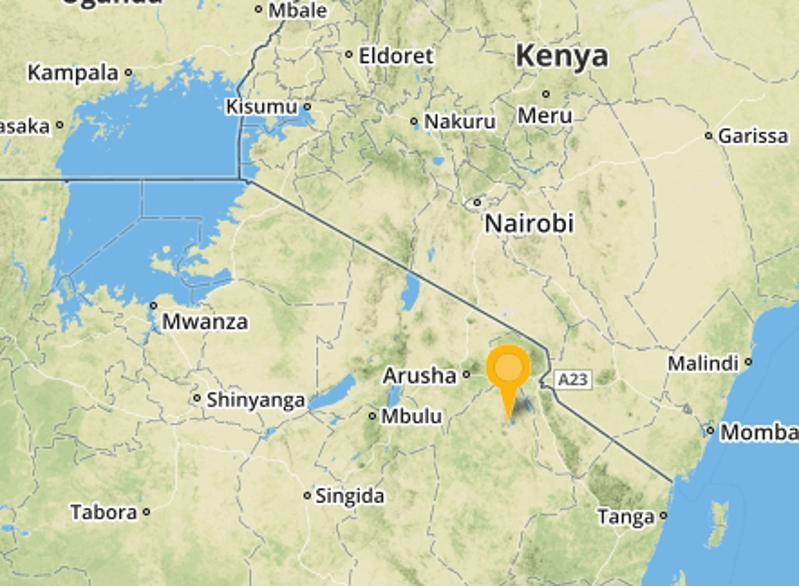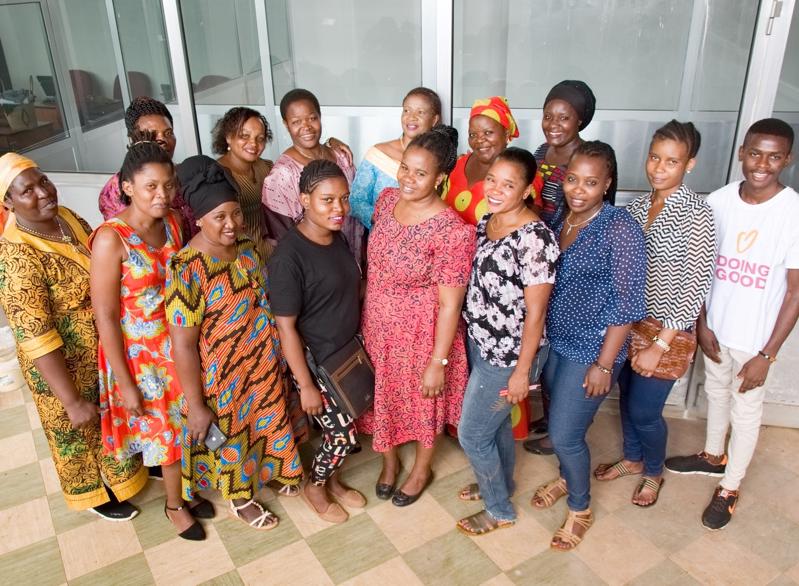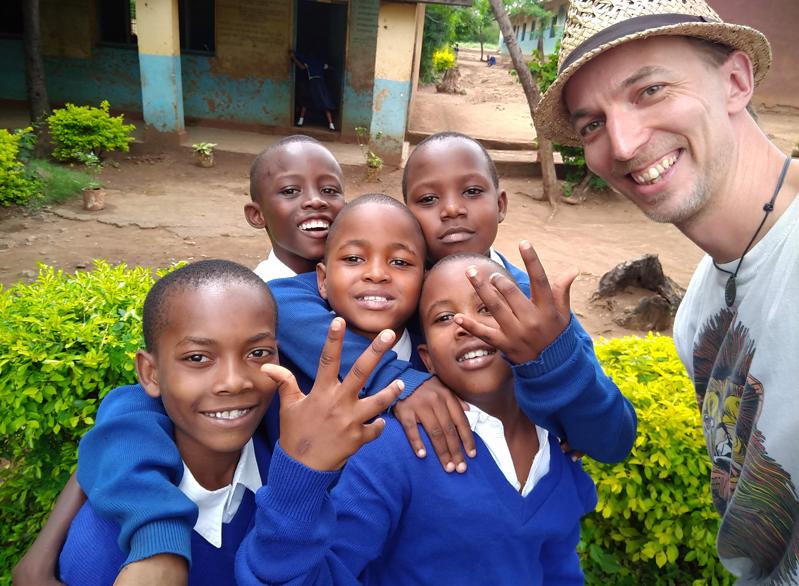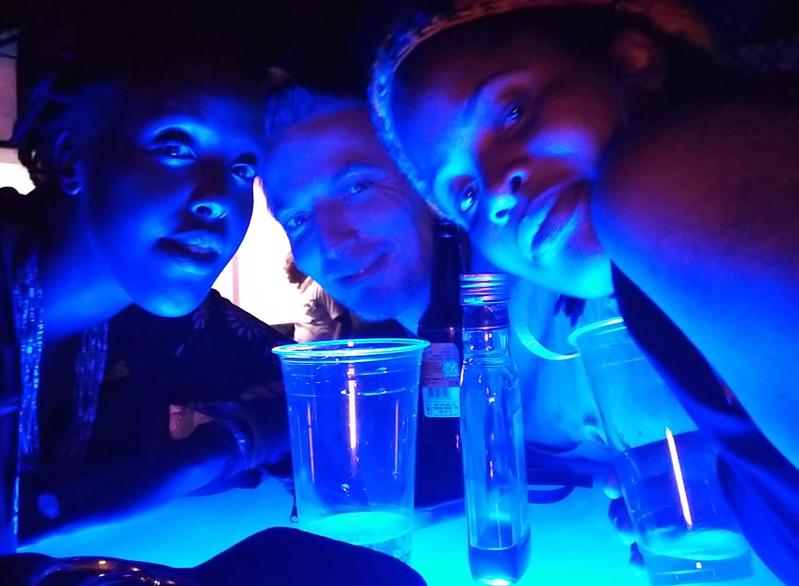Our life Untethered
This week we would be working with YAAPHA, a local organisation working with people that had been affected by HIV in their community.
On our first day of work, Caz would be heading to the training centre to work with the local women we met briefly the day before and Mark to a local school.
We had been told that we would be picked up at 8am, and despite being ready and outside the gate at 10 past the hour, we were only picked up at 0845 by David, one of the volunteer coordinators.
We had assumed he had arrived by car, but when we got outside, we found that we would be taking one of the popular modes of transport, the Bajaj.
They are like the Indian Tut-tut and a lot more specious that either one of us thought, we were both pleasantly surprised to see that we could fit three of us in the back, plus space for luggage.
We set off on the road and enjoyed the cool breeze as we travelled the calm (in comparison to Kampala) streets of Moshi.
Caz was dropped off first at the NBC bank, where she would be meeting her volunteer coordinator.
She was worried about being late, only to get there and find only 2 women ready to start.
She tried not to take this as a personal affront and just set up and patiently waited for the rest to arrive.
By 09:30 most of the group had arrived and they were eager to get started!
Elizabeth would be the translator for Caz, as only two members of the group understood English. They also happened to be the youngest members of the group, as most of the women were mid-thirties and older.
Caz was a little daunted to be training women who were old enough to be her mother/grandmother and who didn’t speak any English.
This would be the first time that Caz would be working with a translator to deliver a business training session, but luckily Elizabeth had a great level of English and they managed to find a comfortable flow of working together to get through the presentation.
Caz also couldn’t rely and feedback due to the language barrier, so she had to rely on reading body language to gauge where they were at.
The first day was just to understand their product and branding, and the rest of the week we would go into communication and marketing.
Despite the slow start the women were engaged and seemed to follow and appreciate the learning, even though some parts may have seemed obscure, Caz promised them they would make sense when we came to the marketing days.
In African culture, people tend to by mild mannered and coy which can hinder their sales ability, so Caz decided to utilise her certification in DISC personality to profile the women, in order to help them with better understand the behavioural traits of customers they may come across.
Psychology is not something that is leaned on in the African culture, but once the women understood their style of communication, they were eager to test their new learning.
Caz likes to design interactive sessions, so she took the opportunity to include some role play after the assessment, to which they seemed to really enjoy.
The rest of the week we focused on how to do authentic branding and marketing, including encouraging the women to use more sustainable and eco-friendly packaging to make their product stand out.
Even thou they had limited English and technical skills; they were keen to learn about tools that could get them into the digital world.
The youngest and most marketing savvy of the group volunteered to create some online content on behalf of the group, so she was particularly attentive about tools.
As we had managed to cram the core learning into 3 days, Caz decided that she could help them further by creating some online content for them. To do this, she encouraged them to bring in their products and props that compliment them on the last day for a photoshoot. Caz roped in Mark to do the product photography and individual portraits.
It was a busy day that included getting them to finish their brand message, set up their products and get portraits taken of them, in a small space with limited time.
The end results were not as great as Mark would have liked, but we could see that the women really appreciated our work, so much so a lot of them asked to take pictures with us!
Carolyn BAGUMA
16 chapters
15 Apr 2020
Chapter 14 - Working at Yaapha
Moshi Tanzania
This week we would be working with YAAPHA, a local organisation working with people that had been affected by HIV in their community.
On our first day of work, Caz would be heading to the training centre to work with the local women we met briefly the day before and Mark to a local school.
We had been told that we would be picked up at 8am, and despite being ready and outside the gate at 10 past the hour, we were only picked up at 0845 by David, one of the volunteer coordinators.
We had assumed he had arrived by car, but when we got outside, we found that we would be taking one of the popular modes of transport, the Bajaj.
They are like the Indian Tut-tut and a lot more specious that either one of us thought, we were both pleasantly surprised to see that we could fit three of us in the back, plus space for luggage.
We set off on the road and enjoyed the cool breeze as we travelled the calm (in comparison to Kampala) streets of Moshi.
Caz was dropped off first at the NBC bank, where she would be meeting her volunteer coordinator.
She was worried about being late, only to get there and find only 2 women ready to start.
She tried not to take this as a personal affront and just set up and patiently waited for the rest to arrive.
By 09:30 most of the group had arrived and they were eager to get started!
Elizabeth would be the translator for Caz, as only two members of the group understood English. They also happened to be the youngest members of the group, as most of the women were mid-thirties and older.
Caz was a little daunted to be training women who were old enough to be her mother/grandmother and who didn’t speak any English.
This would be the first time that Caz would be working with a translator to deliver a business training session, but luckily Elizabeth had a great level of English and they managed to find a comfortable flow of working together to get through the presentation.
Caz also couldn’t rely and feedback due to the language barrier, so she had to rely on reading body language to gauge where they were at.
The first day was just to understand their product and branding, and the rest of the week we would go into communication and marketing.
Despite the slow start the women were engaged and seemed to follow and appreciate the learning, even though some parts may have seemed obscure, Caz promised them they would make sense when we came to the marketing days.
In African culture, people tend to by mild mannered and coy which can hinder their sales ability, so Caz decided to utilise her certification in DISC personality to profile the women, in order to help them with better understand the behavioural traits of customers they may come across.
Psychology is not something that is leaned on in the African culture, but once the women understood their style of communication, they were eager to test their new learning.
Caz likes to design interactive sessions, so she took the opportunity to include some role play after the assessment, to which they seemed to really enjoy.
The rest of the week we focused on how to do authentic branding and marketing, including encouraging the women to use more sustainable and eco-friendly packaging to make their product stand out.
Even thou they had limited English and technical skills; they were keen to learn about tools that could get them into the digital world.
The youngest and most marketing savvy of the group volunteered to create some online content on behalf of the group, so she was particularly attentive about tools.
As we had managed to cram the core learning into 3 days, Caz decided that she could help them further by creating some online content for them. To do this, she encouraged them to bring in their products and props that compliment them on the last day for a photoshoot. Caz roped in Mark to do the product photography and individual portraits.
It was a busy day that included getting them to finish their brand message, set up their products and get portraits taken of them, in a small space with limited time.
The end results were not as great as Mark would have liked, but we could see that the women really appreciated our work, so much so a lot of them asked to take pictures with us!

We ended the session with a speaker from NBC, who also provided the training space and then the presentation of certificates.
Before we left, one woman stood up to thank Caz for all her work and giving her time and led a local style applause which included rubbing your hands together, clamping in unison three times and then letting out these shrieks of joy. Caz was touched and was a big fan of this style of applause.
Marks week was very different in comparison, as he had the pleasure of working outdoors and with students aged 7 – 11 y/o. Yaapha work with several local schools to help promote conservation and environmental education. They help with the schools by creating vegetable gardens, planting trees, trimming hedges and delivering classes about the environment. Although Mark used to work with young people in care homes many years ago, he had never worked in a school before so he was anxious about how the week would go. On the first day he was asked to introduce himself to the class and inform them what he would be doing, but he hadn’t had much briefing on what he was expected to do or say so this was a little scary and off the cuff. But once Mark had introduced himself to some of the classes, he spent his first day trimming hedges in the school and talking to the other volunteers about what other work there was to do. Many of the children in the school had found out there was a Msungu around so were keen to come say hello.

Mark slowly got used to being in the school and made friends with several teachers, although communication was a little difficult. He was looking forward to getting Swahili lessons at the end of the first day but sadly that didn’t happen. So he had to find what words he could from asking the teachers.
Each day Mark worked on a different part of the school, the main project being preparing beds for planting both vegetables and fruit trees. Many of the young people came out to help, and although at times the language barrier was a challenge, the children were very well behaved and keen to help. Mark thought it was hilarious that a school would have several tools including a machete as surely this would never happen in the UK! After a few days of hard work, Mark had the blisters to prove it, the beds were all ready for planting. The children got involved in helping to plant both the trees and the vegetable patch. They all took a hand full of seeds and planted across the beds, and then ran to the storage area to take a watering can, a plastic petrol canister with one side cut out! They watered the beds and were all very careful not to walk on the freshly hoed soil. The children loved getting their hands dirty and working with tools and were smiley and chatty. Many of the children that watched would shout ‘Mr Allen’ and then wave.
For the final day Mark was asked to take a lesson on environmental education. His briefing was a little vague and no one really seemed to know what the lesson would involve. One of the volunteers was

supposed to take the class with him and help translate and sent him some PowerPoint slides. Mark knew there was no projector at school so was surprised to receive PowerPoint slides, but he assumed this was to help guide him in the class. The slides were not particular nice to look at and had way too much detail for the age range of the class. So Mark adjusted the slides and re wrote them all from scratch to prepare the subject matter.
On the morning of the class Mark travelled alone in a Bajaj to the School and managed to find it without getting lost. However, no other volunteer was there, he didn’t have a translator or some one to do the class with! By this point Mark had a good working relationship with some of the teachers and the Schools head teacher so sat and waited for the class and the other volunteers to arrive. Luckily one volunteer arrived who had good English who could help translate, but the main coordinator who Mark thought was doing the class with was called away to work elsewhere. Mark felt relieved that he had copied the slides to his phone so he could remind himself of the content he was to teach. Mark was very aware that his handwriting was not that clear, so writing the content on the black board was going to be interesting!
However, the class went well, and the translation gave him time to re-read his notes and to make sure he took his time and was clear. The class seemed to listen and take in everything and asked several questions at the end of each section. At the end of the class the students undertook an activity that involved observing the nature within the school grounds and drawing detailed pictures to learn more about the item they picked up. The young people appeared to enjoy this activity and it helped with filling in the time! After around an hour the teacher arrived to take over much to Marks relief!
Mark knew that he had to return to the other venue to help Caz take product photographs, so it was a rushed goodbye before taking a motorbike taxi back. Mark was relieved to get through his time in the school but overall had enjoyed the experience.
The week had gone fast, with our morning spent working, our afternoons spent prepping for the following day, and the occasional jaunt to the local bar when the house was too hot to bare.
We didn’t have to worry about food as we had all our meals taken care of for the week, with David arriving daily to deliver Lunch and Dinner, and doing our dishes!
At the end of the week we invited Elizabeth the lead coordinator to go out with us so we could check out the local night life. We were craving some Nyama Choma (local BBQ), so we gave David the night off sorting dinner and headed to Hugo Bar. It was a typical outdoor bar with sports playing on the television that Elizabeth had promised would have the best Nyama Choma with goat meat.
Before going out, we had already started day drinking with our new favourite local drink Valeur. A cheap brandy that we could buy by the bottle at our local bar. By the time we got to Hugo’s we planned to slow down a bit until we had a chance to line our stomachs for the night ahead.
The goat meat was underwhelming and mostly bone, but the chicken was great.
We got a shock when the bill came and we realised that we had been

given doubles instead of singles, a neat trick to make the tourists pay more! After reprimanding the waiter just a little, we headed to Red Stone night club. It was probably the biggest club in the area, and we were expecting a good night. It too was large and open on one part with food being served, but also had a nightclub on the other side. It was busy, but too early to go to the club side, so we settled in for more drinks and people watched, people watching us. We had got used to it by this point and it wasn’t the worst we had experienced.
We decided to head to the club side about 11pm, only to find that apart from one group of Muzungu’s we were the only ones there. Elizabeth had assured us that it would get full, so in the meantime Caz and Elizabeth joked about the idea of Mark being picked up by the local “working” women.
Before we knew it, the club got filled up with young bodies ready to party!
There were more groups of Muzungu amongst the crowd, so Mark didn’t stick out like a sore thumb.
Elizabeth enjoyed having a dancing partner in Caz as she normally didn’t have a chance to go out, and even more so when we would protect her from the multiple admirers that surrounded her like prey.
It was a great way to end the week and see another side of Moshi, but also affirmed that we had made a friend for life in Elizabeth.
1.
Chapter 1 - The long journey
2.
Chapter 2 - Power of a smile
3.
Chapter 3 - The Boda Way
4.
Chapter 4- The Rain
5.
Chapter 5 - On the road to Mburo
6.
Chapter 6 - Lake Mburo Safari Walk
7.
Chapter 7 - Leaving Lake Bunyoni
8.
Chapter 8 - Wildlife of Uganda
9.
Chapter 9 - Bwindi Forest Walk
10.
Chapter 10 - Journey to Fort Portal
11.
Chapter 11 - Trying to reduce plastic
12.
Chapter 12 - Road to Nairobi
13.
Chapter 13 - A few nights in Nairobi
14.
Chapter 14 - Working at Yaapha
15.
Chapter 15 - Trumper
16.
Chapter 16 - Oasis in Arusha
Share your travel adventures like this!
Create your own travel blog in one step
Share with friends and family to follow your journey
Easy set up, no technical knowledge needed and unlimited storage!
© 2025 Travel Diaries. All rights reserved.